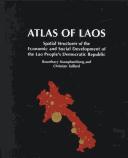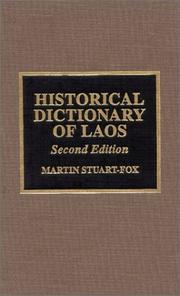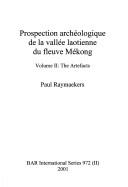| Listing 1 - 10 of 22 | << page >> |
Sort by
|

ISBN: 8776945081 9788776945084 8787062879 9788787062879 9747551411 9789747551419 Year: 2000 Publisher: Copenhagen NIAS
Abstract | Keywords | Export | Availability | Bookmark
 Loading...
Loading...Choose an application
- Reference Manager
- EndNote
- RefWorks (Direct export to RefWorks)
Laos --- Lao People's Democratic Republic --- Sathalanalat Paxathipatai Paxaxôn Lao --- People's Democratic Republic of Laos --- République démocratique populaire Lao --- Lao PDR --- Lao-Issara --- Laosskai︠a︡ Narodno-Demokraticheskai︠a︡ Respublika --- Sāthālanalat Pasāthipatai Pasāson Lāo --- Phrarātsaʻānāchak Lāo --- LNDR --- Lanxang --- Lan Xang --- Lan Sang --- Lan Chang --- ʻĀnāchak Lāo --- RDP lao --- Sō̜. Pō̜. Pō̜. Lāo --- Sō̜pō̜pō̜ Lāo --- Lao P.D.R. --- Saathiaranarath Prachhathipatay Prachhachhon Lao --- Cộng hòa dân chủ nhân dân Lào --- Royaume du Laos --- French Indochina --- Economic conditions --- Social conditions --- RDP Lao
Book
ISBN: 9068323512 Year: 1999 Volume: *62 Publisher: Amsterdam Koninklijk Instituut voor de Tropen (KIT)
Abstract | Keywords | Export | Availability | Bookmark
 Loading...
Loading...Choose an application
- Reference Manager
- EndNote
- RefWorks (Direct export to RefWorks)
Geschiedenis en politiek - bevolking en samenleving - cultuur en religie - economie en milieu
Laos --- Geografie --- Landenreeks. --- Laos. --- Regional documentation --- reisgidsen (genre) --- History of civilization --- Social geography --- Laos ; sociaal-culturele gidsen --- 908 <598> --- reisgidsen --- Laos 994 --- 915.98 --- land- en volkenkunde --- 282 Landbeschrijvingen (sociaal-economisch-cultureel) --- Lao People's Democratic Republic --- Sathalanalat Paxathipatai Paxaxôn Lao --- People's Democratic Republic of Laos --- République démocratique populaire Lao --- Lao PDR --- Lao-Issara --- Laosskai︠a︡ Narodno-Demokraticheskai︠a︡ Respublika --- Sāthālanalat Pasāthipatai Pasāson Lāo --- Phrarātsaʻānāchak Lāo --- LNDR --- Lanxang --- Lan Xang --- Lan Sang --- Lan Chang --- ʻĀnāchak Lāo --- RDP lao --- Sō̜. Pō̜. Pō̜. Lāo --- Sō̜pō̜pō̜ Lāo --- Lao P.D.R. --- Saathiaranarath Prachhathipatay Prachhachhon Lao --- Cộng hòa dân chủ nhân dân Lào --- Royaume du Laos --- French Indochina --- Sociale aardrijkskunde --- Economische aardrijkskunde --- Politiek --- Geschiedenis --- Toerisme --- Azië --- Nederland --- Geneeskunde --- Techniek (wetenschap) --- Atlas --- Museum --- Vietnam --- Zuid-Afrika --- Kust --- Maatschappij --- Film --- Literatuur --- RDP Lao

ISBN: 081083880X Year: 2001 Volume: 35
Abstract | Keywords | Export | Availability | Bookmark
 Loading...
Loading...Choose an application
- Reference Manager
- EndNote
- RefWorks (Direct export to RefWorks)
908 <598> --- Heemkunde. Area studies--Laos --- 908 <598> Heemkunde. Area studies--Laos --- Laos --- Lao People's Democratic Republic --- Sathalanalat Paxathipatai Paxaxôn Lao --- People's Democratic Republic of Laos --- République démocratique populaire Lao --- Lao PDR --- Lao-Issara --- Laosskai︠a︡ Narodno-Demokraticheskai︠a︡ Respublika --- Sāthālanalat Pasāthipatai Pasāson Lāo --- Phrarātsaʻānāchak Lāo --- LNDR --- Lanxang --- Lan Xang --- Lan Sang --- Lan Chang --- ʻĀnāchak Lāo --- RDP lao --- Sō̜. Pō̜. Pō̜. Lāo --- Sō̜pō̜pō̜ Lāo --- Lao P.D.R. --- Saathiaranarath Prachhathipatay Prachhachhon Lao --- Cộng hòa dân chủ nhân dân Lào --- Royaume du Laos --- French Indochina --- History --- Dictionaries --- RDP Lao

ISBN: 1841712590 1841712612 1841712620 9781841712628 9781841712611 Year: 2001 Volume: 972/1-2 Publisher: Oxford: Archaeopress,
Abstract | Keywords | Export | Availability | Bookmark
 Loading...
Loading...Choose an application
- Reference Manager
- EndNote
- RefWorks (Direct export to RefWorks)
Pottery, Roman --- Tunisia --- Antiquities, Roman --- Excavations (Archaeology) --- Archaeological digs --- Archaeological excavations --- Digs (Archaeology) --- Excavation sites (Archaeology) --- Ruins --- Sites, Excavation (Archaeology) --- Archaeology --- Laos --- Mekong River Valley --- Mekong Valley --- Lao People's Democratic Republic --- Sathalanalat Paxathipatai Paxaxôn Lao --- People's Democratic Republic of Laos --- République démocratique populaire Lao --- Lao PDR --- Lao-Issara --- Laosskai︠a︡ Narodno-Demokraticheskai︠a︡ Respublika --- Sāthālanalat Pasāthipatai Pasāson Lāo --- Phrarātsaʻānāchak Lāo --- LNDR --- Lanxang --- Lan Xang --- Lan Sang --- Lan Chang --- ʻĀnāchak Lāo --- RDP lao --- Sō̜. Pō̜. Pō̜. Lāo --- Sō̜pō̜pō̜ Lāo --- Lao P.D.R. --- Saathiaranarath Prachhathipatay Prachhachhon Lao --- Cộng hòa dân chủ nhân dân Lào --- Royaume du Laos --- French Indochina --- Antiquities --- RDP Lao --- Pottery, Roman - Tunisia --- Tunisia - Antiquities, Roman
Book
ISBN: 1455280321 145276882X 1280892471 1452729638 9786613733788 Year: 2004 Publisher: Washington, D.C. : International Monetary Fund,
Abstract | Keywords | Export | Availability | Bookmark
 Loading...
Loading...Choose an application
- Reference Manager
- EndNote
- RefWorks (Direct export to RefWorks)
This paper on the Poverty Reduction Strategy Papers (PRSPs) on the Lao People’s Democratic Republic (PDR) explains macroeconomic, structural, and social policies in support of growth and poverty reduction, as well as associated external financing needs and major sources of financing. The Lao PDR’s long-term national development goal is to be achieved through sustained equitable economic growth and social development, while safeguarding the country’s social, cultural, economic, and political identity. The government’s sustained effort to eradicate poverty will become a mass mobilization exercise, empowering local communities and providing a coherent framework for mutually supportive actions by all stakeholders.
Poverty --- Destitution --- Wealth --- Basic needs --- Begging --- Poor --- Subsistence economy --- Laos --- Lao People's Democratic Republic --- Sathalanalat Paxathipatai Paxaxôn Lao --- People's Democratic Republic of Laos --- République démocratique populaire Lao --- Lao PDR --- Lao-Issara --- Laosskai︠a︡ Narodno-Demokraticheskai︠a︡ Respublika --- Sāthālanalat Pasāthipatai Pasāson Lāo --- Phrarātsaʻānāchak Lāo --- LNDR --- Lanxang --- Lan Xang --- Lan Sang --- Lan Chang --- ʻĀnāchak Lāo --- RDP lao --- Sō̜. Pō̜. Pō̜. Lāo --- Sō̜pō̜pō̜ Lāo --- Lao P.D.R. --- Saathiaranarath Prachhathipatay Prachhachhon Lao --- Cộng hòa dân chủ nhân dân Lào --- Royaume du Laos --- French Indochina --- Economic conditions. --- Economic policy. --- RDP Lao --- Social Services and Welfare --- Demography --- Poverty and Homelessness --- Education: General --- Health: General --- Welfare, Well-Being, and Poverty: General --- Government Policy --- Provision and Effects of Welfare Program --- Demographic Economics: General --- Education --- Health economics --- Poverty & precarity --- Social welfare & social services --- Population & demography --- Health --- Poverty reduction --- Population and demographics --- Population
Book
ISBN: 9812305602 9812303561 9812303553 Year: 2006 Publisher: Singapore : Institute of Southeast Asian Studies,
Abstract | Keywords | Export | Availability | Bookmark
 Loading...
Loading...Choose an application
- Reference Manager
- EndNote
- RefWorks (Direct export to RefWorks)
More than a quarter of century after the end of the war in 1975, the Lao leadership is still in search for a compelling nationalist narration. Its politics of culture and representation appear to be caught between the rhetoric of preservation and the desire for modernity. Meanwhile, originating from the periphery where ethnic minorities had hitherto been symbolically, politically and administratively confined, the participation of some of their members in the Indochina Wars (1945-75) exposed these individuals to socialization and politicization processes. This rigorously researched and cogently argued book is a fine-grained analysis of substantial ethnographic material, showing the politics of identity, the geographies of memory and the power of narratives of some members of ethnic minority groups who fought during the Vietnam War in the Lao People's Liberation Army and/or were educated within the revolutionary administration. No study has ever been conducted on the latter's views on the national(ist) project of the late socialist era. Their own perceptions of their membership of the nation have been overlooked. Post-War Laos is a set to be a landmark study, and an original contribution which refines established theories of nationalism, such as Anderson's 'imagined community', by addressing a common weakness: namely, their tendency to deny agency to individuals, who in fact interpret their relationship to, and place within, the nation in a variety of ways that may change according to time and circumstance.
Ethnicity --- Nationalism --- Consciousness, National --- Identity, National --- National consciousness --- National identity --- International relations --- Patriotism --- Political science --- Autonomy and independence movements --- Internationalism --- Political messianism --- Ethnic identity --- Group identity --- Cultural fusion --- Multiculturalism --- Cultural pluralism --- History. --- Laos --- Lao People's Democratic Republic --- Sathalanalat Paxathipatai Paxaxôn Lao --- People's Democratic Republic of Laos --- République démocratique populaire Lao --- Lao PDR --- Lao-Issara --- Laosskai︠a︡ Narodno-Demokraticheskai︠a︡ Respublika --- Sāthālanalat Pasāthipatai Pasāson Lāo --- Phrarātsaʻānāchak Lāo --- LNDR --- Lanxang --- Lan Xang --- Lan Sang --- Lan Chang --- ʻĀnāchak Lāo --- RDP lao --- Sō̜. Pō̜. Pō̜. Lāo --- Sō̜pō̜pō̜ Lāo --- Lao P.D.R. --- Saathiaranarath Prachhathipatay Prachhachhon Lao --- Cộng hòa dân chủ nhân dân Lào --- Royaume du Laos --- French Indochina --- Ethnic relations --- Political aspects. --- Politics and government --- RDP Lao
Book
ISBN: 1576073289 Year: 1991 Volume: v. 133 Publisher: Oxford, England ; Santa Barbara, Calif. : Clio Press,
Abstract | Keywords | Export | Availability | Bookmark
 Loading...
Loading...Choose an application
- Reference Manager
- EndNote
- RefWorks (Direct export to RefWorks)
Regions & Countries - Asia & the Middle East --- General --- History & Archaeology --- Southeast Asia --- Bibliography - General --- Laos --- Lao People's Democratic Republic --- Sathalanalat Paxathipatai Paxaxôn Lao --- People's Democratic Republic of Laos --- République démocratique populaire Lao --- Lao PDR --- Lao-Issara --- Laosskai︠a︡ Narodno-Demokraticheskai︠a︡ Respublika --- Sāthālanalat Pasāthipatai Pasāson Lāo --- Phrarātsaʻānāchak Lāo --- LNDR --- ʻĀnāchak Lāo --- RDP Lao --- Sō̜. Pō̜. Pō̜. Lāo --- Sō̜pō̜pō̜ Lāo --- Lao P.D.R. --- Saathiaranarath Prachhathipatay Prachhachhon Lao --- Cộng hòa dân chủ nhân dân Lào --- Royaume du Laos --- French Indochina
Book
ISBN: 2709916037 2709917610 Year: 2006 Publisher: Paris : IRD. Institut de recherche pour le développement,
Abstract | Keywords | Export | Availability | Bookmark
 Loading...
Loading...Choose an application
- Reference Manager
- EndNote
- RefWorks (Direct export to RefWorks)
Les « mangeurs de forêts » ont mauvaise réputation. Parce qu’ils défrichent chaque année une parcelle de végétation avant d’y mettre le feu, les agriculteurs montagnards d’Asie du Sud-Est seraient les premiers responsables de la déforestation. Culturellement distincts de leurs voisins des plaines, ils font aussi figure de populations arriérées, incapables d’abandonner des pratiques qui les maintiendraient dans la pauvreté. D’où la nécessité de les déplacer et de les regrouper dans les vallées, pour les « sédentariser » et les « développer ». Tel est en tout cas le discours des Etats, souvent relayé et cautionné par les institutions internationales et les médias. Pourtant, l’agriculture sur brûlis n’est pas toujours et partout une aberration écologique ou économique. Chez les montagnards khmou du Nord-Laos, il s’agit d’un véritable mode de vie et non d’une technique de survie. L’agriculture sur brûlis exprime leur rapport à la nature, inspire leurs catégories mentales et leur système symbolique. Elle participe de la reproduction des liens sociaux dans les maisons et les villages. Elle structure enfin les relations qu’ils entretiennent avec leurs voisins et avec l’État. Ces « chroniques des cendres » restituent leur vision du monde et retracent l’histoire des relations interethniques au Nord-Laos. Elles témoignent aussi des liens complexes tissés par les minorités avec l’État-nation dans ce pays et de l’ampleur des recompositions sociales et territoriales en cours dans le contexte post-communiste contemporain.
Khmu' (Southeast Asian people) --- Khmu (Peuple d'Asie du Sud-Est) --- Social life and customs --- Moeurs et coutumes --- Laos --- Ethnic relations. --- Relations interethniques --- Shifting cultivation --- Regions & Countries - Asia & the Middle East --- History & Archaeology --- Southeast Asia --- Social conditions. --- Bush fallow cultivation --- Cultivation, Shifting --- Forest fallow cultivation --- Shifting agriculture --- Slash and burn cultivation --- Swidden farming --- Kamhmu (Southeast Asian people) --- Kammu (Southeast Asian people) --- Kamu (Southeast Asian people) --- Kha Mou (Southeast Asian people) --- Khamu (Southeast Asian people) --- Khamuk (Southeast Asian people) --- Kmhmu' (Southeast Asian people) --- Mou (Southeast Asian people) --- Pouteng (Southeast Asian people) --- Lao People's Democratic Republic --- Sathalanalat Paxathipatai Paxaxôn Lao --- People's Democratic Republic of Laos --- République démocratique populaire Lao --- Lao PDR --- Lao-Issara --- Laosskai︠a︡ Narodno-Demokraticheskai︠a︡ Respublika --- Sāthālanalat Pasāthipatai Pasāson Lāo --- Phrarātsaʻānāchak Lāo --- LNDR --- Lanxang --- Lan Xang --- Lan Sang --- Lan Chang --- ʻĀnāchak Lāo --- RDP lao --- Sō̜. Pō̜. Pō̜. Lāo --- Sō̜pō̜pō̜ Lāo --- Lao P.D.R. --- Saathiaranarath Prachhathipatay Prachhachhon Lao --- Cộng hòa dân chủ nhân dân Lào --- Royaume du Laos --- Social life and customs. --- Khơ mú (Southeast Asian people) --- Mứn Xen (Southeast Asian people) --- Pu Thênh (Southeast Asian people) --- Tày Hạy (Southeast Asian people) --- Tềnh (Southeast Asian people) --- Xá Cẩu (Southeast Asian people) --- Agriculture --- Burning of land --- Clearing of land --- Cropping systems --- Fallowing --- Tillage --- Ethnology --- French Indochina --- RDP Lao --- agriculture --- déforestation --- mobilité --- croyance --- minorité ethnique --- lignage --- société traditionnelle --- rituel --- organisation sociale --- identité culturelle --- mythe
Book
ISBN: 1462336256 1451995938 1280978392 9786613750006 1452764948 Year: 2007 Publisher: Washington, D.C. : International Monetary Fund,
Abstract | Keywords | Export | Availability | Bookmark
 Loading...
Loading...Choose an application
- Reference Manager
- EndNote
- RefWorks (Direct export to RefWorks)
The staff report for the 2007 Article IV Consultation on the Lao People’s Democratic Republic (PDR) explains economic performance. Growth is robust and increasingly reliant on large export-oriented mining and hydropower projects. The economic outlook is promising, but the outcome clearly depends on the government’s policy response to the emerging resource bonanza. The current fiscal regimes for the resource sector have several sound features, but some improvements are needed to align them to best international practices.
Fiscal policy --- Monetary policy --- Monetary management --- Economic policy --- Currency boards --- Money supply --- Tax policy --- Taxation --- Finance, Public --- Government policy --- International Monetary Fund --- Internationaal monetair fonds --- International monetary fund --- Laos --- Lao People's Democratic Republic --- Sathalanalat Paxathipatai Paxaxôn Lao --- People's Democratic Republic of Laos --- République démocratique populaire Lao --- Lao PDR --- Lao-Issara --- Laosskai︠a︡ Narodno-Demokraticheskai︠a︡ Respublika --- Sāthālanalat Pasāthipatai Pasāson Lāo --- Phrarātsaʻānāchak Lāo --- LNDR --- Lanxang --- Lan Xang --- Lan Sang --- Lan Chang --- ʻĀnāchak Lāo --- RDP lao --- Sō̜. Pō̜. Pō̜. Lāo --- Sō̜pō̜pō̜ Lāo --- Lao P.D.R. --- Saathiaranarath Prachhathipatay Prachhachhon Lao --- Cộng hòa dân chủ nhân dân Lào --- Royaume du Laos --- French Indochina --- Economic policy. --- RDP Lao --- Banks and Banking --- Exports and Imports --- Foreign Exchange --- Macroeconomics --- Public Finance --- International Lending and Debt Problems --- Debt --- Debt Management --- Sovereign Debt --- Trade: General --- National Government Expenditures and Related Policies: General --- International economics --- Public finance & taxation --- Currency --- Foreign exchange --- Banking --- Public debt --- External debt --- Expenditure --- Export performance --- Exchange rates --- International trade --- Debts, External --- Debts, Public --- Exports --- Expenditures, Public
Book
ISBN: 1455239968 1452738343 1280889454 1451883307 9786613730763 Year: 2004 Publisher: Washington, D.C. : International Monetary Fund,
Abstract | Keywords | Export | Availability | Bookmark
 Loading...
Loading...Choose an application
- Reference Manager
- EndNote
- RefWorks (Direct export to RefWorks)
The Joint Staff Advisory Note (JSAN) of the Poverty Reduction Strategy Paper Progress Report for the Lao People’s Democratic Republic (PDR) reviews the strengths and weaknesses of poverty reduction objectives and strategies. The Lao PDR National Growth and Poverty Eradication Strategy (NGPES) is the first full poverty reduction strategy prepared by the government. The NGPES describes the participatory process underpinning the development of the strategy. Capacity constraints, weak governance, and a difficulty translating strategic objectives into concrete actions are the main obstacles to the reform process.
Poverty --- Finance, Public --- Cameralistics --- Public finance --- Public finances --- Currency question --- Destitution --- Wealth --- Basic needs --- Begging --- Poor --- Subsistence economy --- Laos --- Lao People's Democratic Republic --- Sathalanalat Paxathipatai Paxaxôn Lao --- People's Democratic Republic of Laos --- République démocratique populaire Lao --- Lao PDR --- Lao-Issara --- Laosskai︠a︡ Narodno-Demokraticheskai︠a︡ Respublika --- Sāthālanalat Pasāthipatai Pasāson Lāo --- Phrarātsaʻānāchak Lāo --- LNDR --- Lanxang --- Lan Xang --- Lan Sang --- Lan Chang --- ʻĀnāchak Lāo --- RDP lao --- Sō̜. Pō̜. Pō̜. Lāo --- Sō̜pō̜pō̜ Lāo --- Lao P.D.R. --- Saathiaranarath Prachhathipatay Prachhachhon Lao --- Cộng hòa dân chủ nhân dân Lào --- Royaume du Laos --- French Indochina --- Appropriations and expenditures. --- Economic conditions. --- Economic policy. --- RDP Lao --- Public Finance --- Natural Resources --- Social Services and Welfare --- National Government Expenditures and Related Policies: General --- Government Policy --- Provision and Effects of Welfare Program --- Agricultural and Natural Resource Economics --- Environmental and Ecological Economics: General --- Public finance & taxation --- Social welfare & social services --- Environmental management --- Public financial management (PFM) --- Expenditure --- Poverty reduction strategy --- Natural resources --- Poverty reduction --- Environment --- Expenditures, Public
| Listing 1 - 10 of 22 | << page >> |
Sort by
|

 Search
Search Feedback
Feedback About UniCat
About UniCat  Help
Help News
News